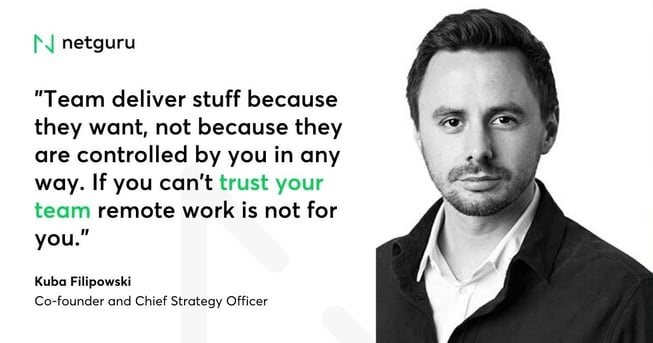How To Be A Remote Founder

Important factors to working remotely:
-
Excellent communication skills. Whatever your role might be-cofounder, co-worker, contractor, or client, good communication is always the key to a good remote work. Good communication means: precise, straight to the point, simple, calm, and transparent.
-
Responsiveness. Your team needs to know that you are there even though they can’t see you. Be responsive through your messages, read email frequently, and react quickly. Always be in the flow of information.
-
Disciplined communication. Being remote means planning all of your communication ahead of time. Schedule calls well in advance and be on-time for all video conferences.
-
Be present on-site from time to time. While working remotely I tried to be physically present in the Netguru HQ at least a few times a month (2-4). If it’s not possible, I think it’s important to at least be present on company retreats or other internal events every month or so.
What a remote coworker needs from his or her team:
-
Motivation and Trust. Team delivers stuff because they want not because they are controlled by you in any way. Sounds obvious but if you are control freak its difficult to deal with the idea that you can’t see your team physically working. You need to trust your team. If you can’t trust your team remote work is not for you.

-
Communication tools. Good tools for communication are essential. You need to use them and like them. In our case we use: Slack, Gmail, Google Hangouts, Google Drive, Jira, and Github.
-
Inclusiveness. One remote person means that whole team is working remotely even when they work in the same room. It’s easy for the people in the room to have an in-person meeting and exclude remote workers. It can be difficult at the beginning, but it’s crucial to have all communication on some digital channel accessible by all parties involved in the project/work at all times. Keep in mind that the communication tools mentioned above should facilitate this as much as possible.
-
A good working environment. Remote working can be super frustrating when your internet connection is poor or background noise is preventing you from having productive video call.

Difficulties of working remotely:
- It’s difficult to set up super quick, ad hoc meetings when you just need to pass few words to your colleague who is sitting next to you. Slack or a quick Hangout are good replacements, but not perfect in every situation.
- The small stuff that makes you feel like part of a team isn’t always there. All the knowledge that you gain about your colleagues, the small talk, etc. It’s important to set up and attend company retreats or events where you can build up personal relationship.
Remote work is a part of our daily life and 99% of the time, we work remotely with our clients. It's hard to understand their perspective if you’ve never worked remotely, but being a remote co-founder allows me to understand what it’s like a bit better.
.jpg?width=50&height=50&name=Kuba%201%20k%20(1).jpg)

.jpg?width=240&height=240&name=Kuba%201%20k%20(1).jpg)
